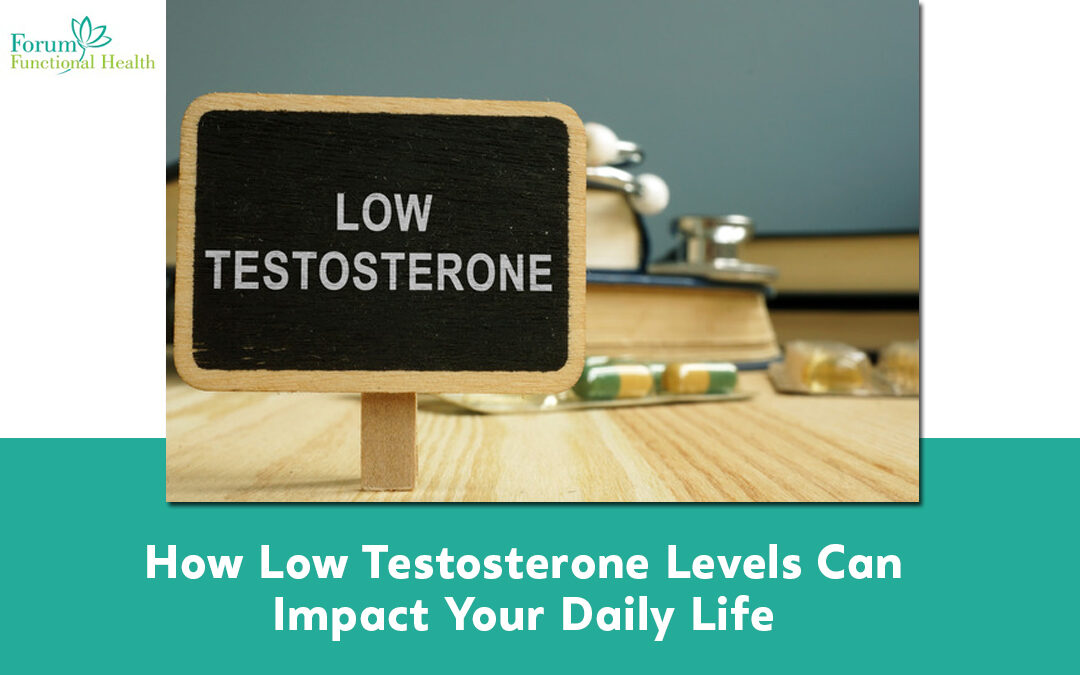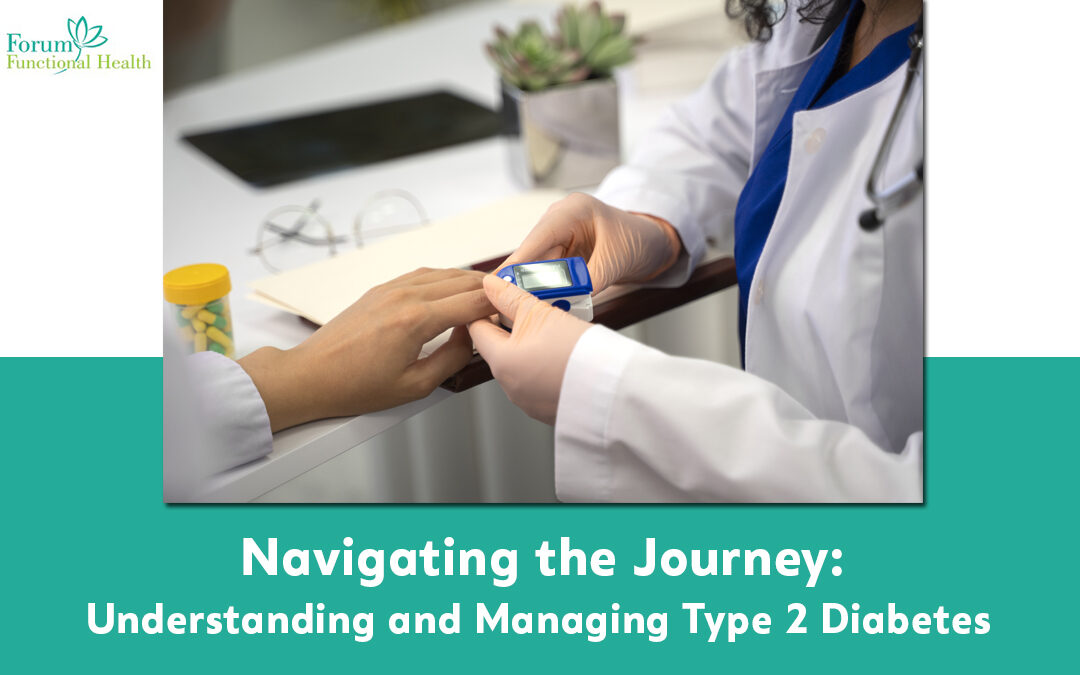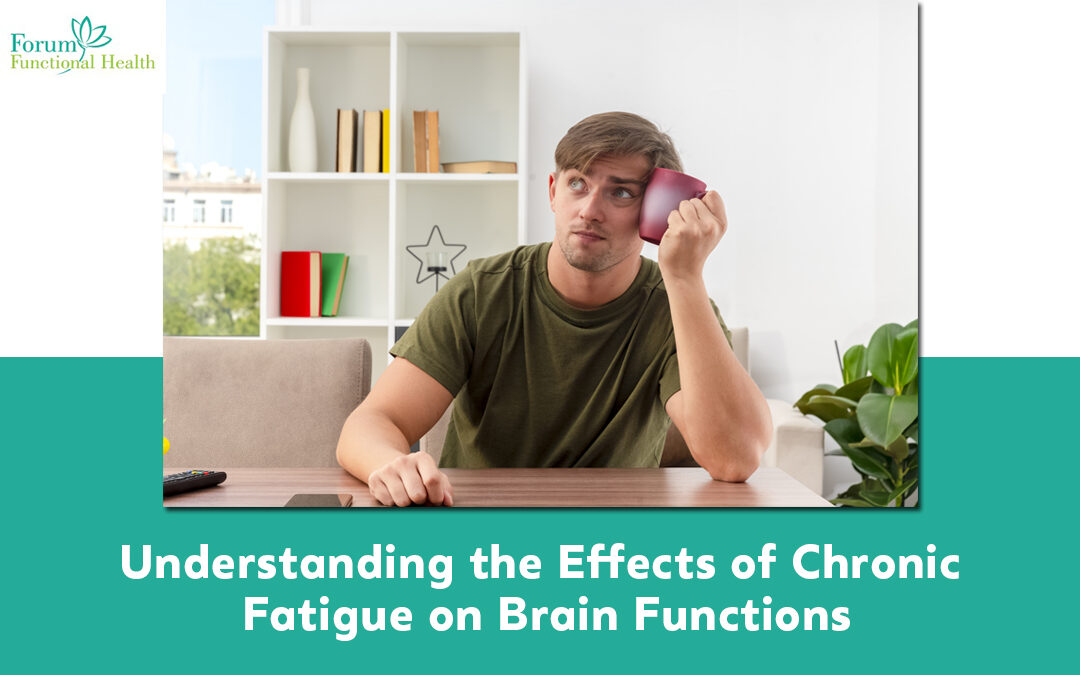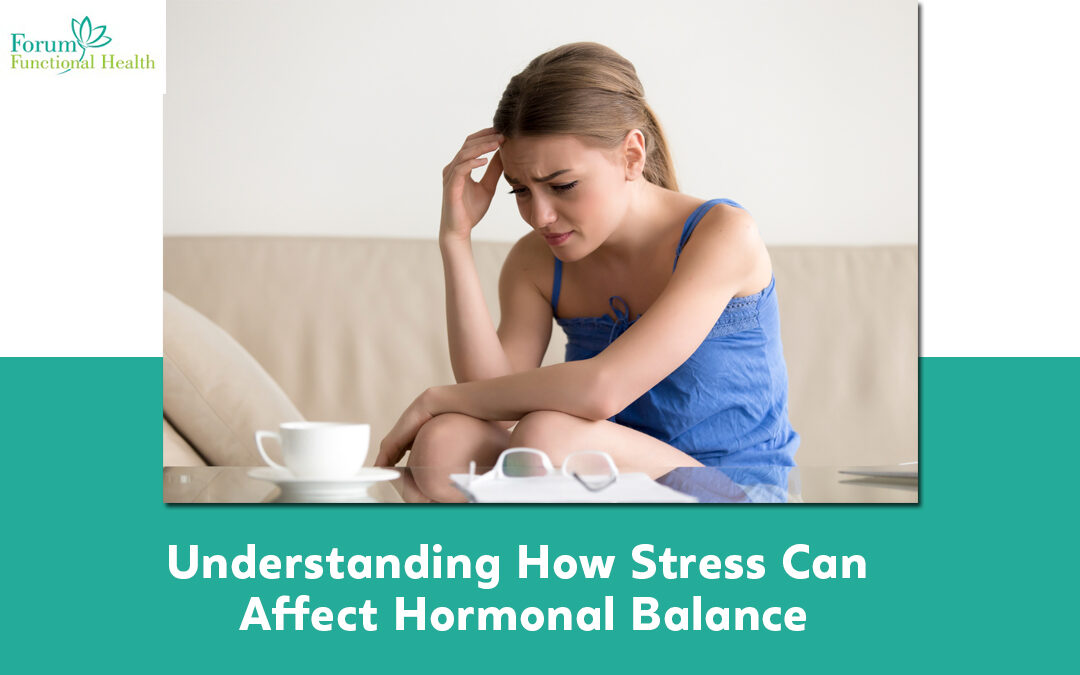
by Forum Functional Health Center | Feb 12, 2024 | Erectile Dysfunction
Erectile Dysfunction (ED) is a common condition that affects millions of men worldwide. While its physical implications are widely recognized, its impact on relationships and mental health is often underestimated. In this blog post, we delve into how ED can affect relationships and mental well-being, offering insights into coping mechanisms and treatment options.
The Emotional Toll of Erectile Dysfunction
When a man experiences ED, it can lead to feelings of inadequacy, frustration, and even depression. Many men tie their masculinity to their ability to perform sexually, and when that ability is compromised, it can shake their confidence to the core. They may feel ashamed or embarrassed, leading to a reluctance to discuss the issue with their partners or seek help from a healthcare professional.
In relationships, ED can strain intimacy and communication. Partners may feel rejected or unattractive, leading to resentment and distance. Over time, this can erode the foundation of the relationship, causing further emotional distress for both parties. The fear of disappointing their partner can weigh heavily on men with ED, creating a cycle of anxiety that exacerbates the problem.
Navigating Relationship Challenges
Addressing ED within a relationship requires open and honest communication. Both partners need to understand that ED is a medical condition and not a reflection of their love or attraction for each other. Creating a safe space to discuss feelings and concerns can help alleviate tension and strengthen the bond between partners.
Couples therapy can also be beneficial for navigating the challenges posed by ED. A qualified therapist can provide guidance on improving communication, building intimacy, and exploring alternative forms of sexual expression. By working together as a team, couples can overcome the obstacles presented by ED and emerge stronger than ever.
Seeking Support and Treatment Options
It’s essential for men with ED to know that they are not alone and that help is available. Seeking support from healthcare professionals is the first step towards reclaiming their sexual health and overall well-being. Forum Functional Health centers specialize in addressing the root causes of ED through personalized treatment plans tailored to each individual’s needs.
Lifestyle modifications, such as adopting a healthy diet, regular exercise, and stress management techniques, can significantly improve erectile function. Psychological counselling can help men explore the emotional factors contributing to their ED and develop coping strategies to overcome them. Additionally, medications such as Viagra or Cialis may be prescribed to help achieve and maintain erections.
For those who prefer a more anonymous approach, online support groups offer a sense of community and understanding. Sharing experiences with others who are going through similar challenges can provide comfort and validation, reducing feelings of isolation and shame.
In conclusion, erectile dysfunction can have far-reaching effects on relationships and mental health. By addressing the emotional aspects of ED and seeking appropriate support and treatment, men can regain control of their lives and enjoy fulfilling relationships. Whether through lifestyle modifications, psychological counseling, medications, or anonymous support, there is hope for overcoming the challenges posed by ED and embracing a healthier, happier future.

by Forum Functional Health Center | Feb 9, 2024 | Low Testosterone
Low testosterone levels, also known as Low T, can have a significant impact on various aspects of daily life for men. From energy levels to mood and overall well-being, understanding the implications of low testosterone is crucial for maintaining a healthy lifestyle. In this blog, we’ll explore how Low Testosterone levels can affect different areas of daily life and discuss potential treatment options.
Energy Levels and Fatigue: One of the most noticeable effects of low testosterone levels is a decrease in energy levels. Testosterone plays a vital role in regulating energy production within the body. When testosterone levels are low, men may experience fatigue, lethargy, and a general lack of motivation. This can make it challenging to perform daily tasks, engage in physical activity, or even concentrate at work.
Mood and Emotional Well-being: Testosterone also influences mood and emotional well-being. Low testosterone levels have been linked to symptoms of depression, irritability, and mood swings. Men may find themselves feeling more anxious or stressed than usual, which can impact their relationships and overall quality of life. Understanding the emotional implications of low testosterone is essential for seeking appropriate support and treatment.
Sexual Health and Libido: Testosterone plays a crucial role in sexual health and libido. Men with low testosterone levels may experience a decrease in sex drive, erectile dysfunction, or difficulty achieving orgasm. These issues can have a significant impact on intimate relationships and self-esteem. It’s essential to address these symptoms promptly to restore sexual function and improve overall well-being.
Muscle Mass and Strength: Another area affected by low testosterone levels is muscle mass and strength. Testosterone helps maintain muscle tissue and contributes to muscle growth. When testosterone levels are low, men may experience a decline in muscle mass, increased body fat, and reduced strength. This can affect physical performance, exercise capacity, and overall mobility.
Cognitive Function and Memory: Testosterone also plays a role in cognitive function and memory. Low testosterone levels have been associated with cognitive decline, poor concentration, and memory problems. Men may find it challenging to focus on tasks or retain information, which can impact work performance and daily functioning.
A Forum Functional Health approach to addressing hormonal imbalances, such as low testosterone levels, prioritizes holistic assessment and individualized care. This approach encompasses various elements, starting with a comprehensive evaluation of lifestyle, nutrition, stress levels, and overall health to identify underlying factors contributing to the hormonal imbalance.
Based on this assessment, tailored treatment plans are crafted to address the unique needs of each individual, emphasizing lifestyle modifications, stress management techniques, nutritional support, and regular monitoring. These interventions aim to naturally support hormone balance and overall well-being.
Where testosterone levels are severely low and necessitate medical intervention, testosterone injection therapy may be recommended by a healthcare professional. Testosterone injection therapy involves the administration of intramuscular injections, typically on a weekly or less frequent basis.
Regular monitoring through blood tests is crucial to ensure the therapy’s effectiveness and adjust the dosage as needed, ensuring optimal hormone levels and overall health outcomes. This integrated approach combines lifestyle modifications with medical intervention, offering a comprehensive and personalized solution to address hormonal imbalances and support long-term wellness.

by Forum Functional Health Center | Feb 7, 2024 | Polycystic ovary syndrome (PCOS)
Polycystic Ovary Syndrome (PCOS) is a common hormonal disorder affecting women of reproductive age, with significant implications for fertility. If you’re navigating PCOS and its impact on your ability to conceive, it’s essential to understand how this condition affects fertility and explore strategies to overcome these challenges.
PCOS and Fertility: Unravelling the Connection
PCOS disrupts the hormonal balance in the body, leading to irregular menstrual cycles and ovulation. Typically, during a menstrual cycle, an egg is released from the ovaries (ovulation), allowing for the possibility of conception. However, in women with PCOS, hormonal imbalances can inhibit ovulation or cause irregular ovulation, making it difficult to predict fertile days and conceive naturally.
High levels of androgens (male hormones) in women with PCOS can also interfere with the development and release of eggs from the ovaries. Additionally, insulin resistance, a common feature of PCOS, can further exacerbate hormonal imbalances and disrupt ovulation, contributing to fertility issues.
Understanding these underlying mechanisms is crucial for individuals with PCOS and their healthcare providers to develop effective strategies for improving fertility outcomes.
Strategies for Enhancing Fertility with PCOS
While PCOS can present challenges for fertility, there are several strategies that individuals can employ to enhance their chances of conceiving:
Maintain a Healthy Lifestyle: Adopting a healthy lifestyle that includes a balanced diet, regular exercise, and stress management techniques can help regulate hormonal imbalances associated with PCOS. Focus on consuming nutrient-rich foods, such as fruits, vegetables, whole grains, and lean proteins, and avoid processed foods and excessive sugars.
Monitor Your Menstrual Cycle: Tracking your menstrual cycle can provide valuable insights into your fertility patterns and help identify potential ovulation issues. There are various apps and tools available to help you monitor your cycle and predict fertile days, allowing for targeted attempts at conception.
Consider Natural Supplements: Some natural supplements, such as myo-inositol, omega-3 fatty acids, and N-acetylcysteine (NAC), have been shown to improve menstrual regularity and ovulation in women with PCOS. Discussing these options with your healthcare provider can help determine if they may be beneficial for you.
Seek Supportive Care: Working with a healthcare provider who specializes in reproductive health and fertility can provide valuable support and guidance throughout your fertility journey. They can offer personalized treatment recommendations tailored to your individual needs and help monitor your progress over time.
Explore Fertility Treatments: In cases where natural approaches are insufficient, fertility treatments such as ovulation induction with medications, intrauterine insemination (IUI), or in vitro fertilization (IVF) may be considered. These options can help overcome ovulation issues associated with PCOS and increase the likelihood of conception.
Empowering Yourself through Knowledge and Support
Navigating fertility challenges with PCOS can be daunting, but it’s essential to remember that you’re not alone. Seeking support from healthcare professionals, support groups, or online communities can provide valuable insights, encouragement, and practical tips for managing PCOS and improving fertility outcomes.
At the same time, educating yourself about PCOS and its impact on fertility empowers you to take an active role in your reproductive health. By understanding the underlying mechanisms of PCOS-related infertility and exploring various strategies for enhancing fertility, you can make informed decisions and take proactive steps towards achieving your family planning goals.
Natural Treatment Approaches for PCOS and Fertility
Fortunately, there are natural treatment approaches that can help manage PCOS and improve fertility outcomes:
Healthy Diet: Adopting a balanced diet rich in whole foods, fruits, vegetables, and lean proteins can help regulate insulin levels and improve hormone balance. Avoiding processed foods, refined sugars, and excessive carbohydrates is essential in managing insulin resistance commonly associated with PCOS.
Regular Exercise: Engaging in regular physical activity, such as walking, swimming, or yoga, can help improve insulin sensitivity and promote weight loss, which may in turn improve fertility outcomes for women with PCOS.
Stress Management: Chronic stress can exacerbate hormonal imbalances and disrupt ovulation. Practicing stress-reducing techniques such as meditation, deep breathing exercises, or mindfulness can help alleviate stress and support hormonal balance.
Herbal Supplements: Certain herbal supplements, such as chasteberry (Vitex agnus-castus) and cinnamon, have been shown to help regulate menstrual cycles and improve fertility in women with PCOS. However, it’s essential to consult with a healthcare provider before starting any herbal supplement regimen.
Acupuncture: Acupuncture, an ancient Chinese healing practice, has shown promise in improving ovulation and menstrual regularity in women with PCOS. It works by stimulating specific points on the body to promote hormonal balance and regulate menstrual cycles.
Seek Professional Care
At Forum Functional Health Center, we take a comprehensive and holistic approach to managing PCOS and promoting fertility. Our team of experienced healthcare practitioners understands the complexities of PCOS and tailors treatment plans to address each individual’s unique needs.
Through personalized dietary counseling, lifestyle modifications, and natural therapies, we aim to regulate hormonal imbalances, improve insulin sensitivity, and enhance overall reproductive health. Our approach emphasizes empowering individuals with PCOS to take charge of their health and well-being through sustainable lifestyle changes.
Additionally, our integrative approach may include collaborative care with other healthcare providers, such as reproductive endocrinologists or fertility specialists, to ensure comprehensive and coordinated management of PCOS-related fertility issues.

by Forum Functional Health Center | Feb 6, 2024 | Diabetes Management
Living with Type 2 diabetes can be challenging, but with a clear understanding and effective management strategies, one can navigate this journey with confidence and improved well-being. This blog aims to simplify the complexities surrounding Type 2 diabetes, offering easy-to-follow advice and practical tips for individuals looking to take control of their health.
Understanding Type 2 Diabetes
At its core, Type 2 diabetes is a metabolic disorder characterized by insulin resistance and high blood sugar levels. It often develops in adulthood, and lifestyle factors such as diet and physical activity play a crucial role in its onset and progression.
The journey begins with understanding the factors that contribute to Type 2 diabetes. Simplifying the science, insulin, a hormone produced by the pancreas, helps regulate blood sugar. In Type 2 diabetes, the body becomes resistant to the effects of insulin, leading to elevated blood sugar levels. Genetics, sedentary lifestyles, and poor dietary choices can contribute to this insulin resistance.
Breaking Down the Basics
Managing Type 2 diabetes starts with education. It’s essential to grasp the basics of how food choices impact blood sugar levels. Carbohydrates, especially sugars and starches, have a direct effect on blood glucose. Monitoring and moderating carbohydrate intake are fundamental aspects of managing diabetes.
A balanced diet that includes whole grains, lean proteins, fruits, and vegetables is key. Portion control and mindful eating can help regulate blood sugar levels. Small, frequent meals spread throughout the day can prevent sharp spikes and crashes in blood sugar.
The Role of Physical Activity
Regular exercise is a cornerstone in managing Type 2 diabetes. Physical activity helps improve insulin sensitivity, allowing cells to use glucose more effectively. It also aids in weight management and contributes to an overall sense of well-being.
Exercise doesn’t have to be strenuous. Even a brisk walk, cycling, or swimming for 30 minutes a day can make a significant difference. Finding activities that bring joy and can be incorporated into daily life is essential for long-term adherence.
Mindful Living for Diabetes Management
Beyond diet and exercise, the mind plays a crucial role in managing Type 2 diabetes. Stress can elevate blood sugar levels, so incorporating stress-reducing activities such as meditation, deep breathing, or yoga is beneficial.
Regular monitoring of blood sugar levels is another essential aspect. Understanding how different foods and activities impact blood glucose empowers individuals to make informed choices. This self-awareness is a valuable tool in diabetes management.
Building a Support System
Navigating the Type 2 diabetes journey doesn’t have to be a solitary endeavor. Building a support system of friends, family, and healthcare professionals is vital. Sharing experiences, seeking advice, and having a reliable network can provide emotional support and practical insights.
Regular check-ups with healthcare providers are essential for monitoring overall health and addressing any concerns promptly. Medication management, if prescribed, should be followed diligently, and any side effects or concerns should be communicated to healthcare professionals.
Celebrating Small Victories
Managing Type 2 diabetes is a continuous journey with ups and downs. Celebrating small victories, whether it’s achieving a fitness goal, maintaining stable blood sugar levels, or making positive lifestyle changes, is crucial for motivation and sustained effort.
Setting realistic goals and acknowledging progress fosters a positive mind-set. Each step towards better health is an achievement worth recognizing, creating a sense of empowerment and control over one’s well-being.
Understanding and managing Type 2 diabetes is a multifaceted journey that involves lifestyle changes, education, and a supportive network. By breaking down the complexities into manageable steps, individuals can take charge of their health and embrace a fulfilling life despite diabetes.
Forum Functional Health Care takes a comprehensive approach to Type 2 diabetes management, acknowledging that it is a complicated journey requiring more than simply medicine and testing. We believe in empowering people via lifestyle changes and promoting a thorough understanding of their health.
Our community support system is intended to create a network for folks started on this adventure. We hope to foster a supportive environment in which members may learn from one another by sharing our experiences, knowledge, and encouragement. We recognize the need of a holistic approach that considers physical, mental, and emotional well-being.

by Forum Functional Health Center | Feb 2, 2024 | Weight Management
Excess weight takes a significant toll on Health and Well-being, with consequences across multiple dimensions. The consequences are far-reaching and complex, ranging from increased heart disease risk to mental health problems. Delving into the specifics provides a thorough understanding of the repercussions. It entails comprehending how the cardiovascular system bears the stress, the metabolic problems that develop, and the complex linkages to mental health.
Recognizing the diverse nature of these repercussions emphasizes the importance of implementing comprehensive health policies. Addressing excess weight requires not only physical health considerations, but also a comprehensive strategy that takes into account mental and emotional well-being.
- Cardiovascular System: Carrying excess weight places additional strain on your heart. It increases the risk of hypertension, high cholesterol, and ultimately, cardiovascular diseases. The heart has to work harder to pump blood, potentially leading to conditions like coronary artery disease and heart failure.
- Metabolic Consequences: Extra weight is often associated with insulin resistance and an increased risk of type 2 diabetes. The body’s ability to regulate blood sugar is compromised, heightening the likelihood of developing diabetes and related complications.
- Joint and Musculoskeletal Issues: Joints bear the brunt of extra weight, leading to conditions such as osteoarthritis. Weight-induced stress on joints can result in chronic pain and decreased mobility, impacting overall quality of life.
- Respiratory Challenges: Carrying excess weight can restrict lung capacity and lead to respiratory issues. Conditions like sleep apnea, characterized by interrupted breathing during sleep, are more prevalent in individuals with obesity.
- Mental Health Impact: The link between excess weight and mental health is profound. Low self-esteem, depression, and anxiety often coexist with obesity. Societal stigma and personal struggles with body image contribute to these mental health challenges.
- Increased Cancer Risk: Certain types of cancer, including breast, colorectal, and endometrial cancers, are more prevalent in individuals with obesity. The exact mechanisms behind this association are complex and multifactorial.
- Liver and Gallbladder Complications: Non-alcoholic fatty liver disease (NAFLD) is common in those carrying extra weight. This condition can progress to more severe liver issues, including cirrhosis.
- Reproductive Health Implications: For both men and women, obesity can affect fertility. In women, it can lead to irregular menstrual cycles and complications during pregnancy, while men may experience reduced testosterone levels and fertility issues.
- Inflammatory Responses: Excess weight triggers chronic low-grade inflammation in the body. This inflammatory state is linked to various health conditions, including atherosclerosis and insulin resistance.
- Longevity and Quality of Life: Overall, the cumulative impact of excess weight can significantly reduce life expectancy and diminish the quality of life. Embracing a healthier lifestyle, including balanced nutrition and regular exercise, is crucial in mitigating these risks.
The Forum Functional Health Center highlights the importance of taking proactive actions to understand and manage the complex impact of obesity on health. The center promotes a holistic approach to well-being that includes regular physical activity, balanced and nutritious food, and increased awareness of mental health. By tackling these pillars together, individuals can effectively prevent and manage the various health concerns linked with excess weight.
The Forum Functional Health Center’s commitment to a comprehensive approach emphasizes the importance of tailored therapy, which promotes not only physical fitness but also mental and nutritional wellness. Individuals can embark on a transforming path toward better health and a higher quality of life by utilizing this comprehensive strategy.

by Forum Functional Health Center | Feb 1, 2024 | Depression
Depression is a serious mental health condition that affects millions of people worldwide. It can have a profound impact on a person’s daily life, relationships, and overall well-being. However, there are steps that can be taken to protect and prioritize your mental health. By understanding the risk factors, recognizing the signs and symptoms, and implementing healthy coping strategies, you can safeguard your mental well-being and reduce your risk of developing depression. This article provides valuable insights and practical tips on how to protect your mental health from depression.
The impact of depression on mental health
Depression goes beyond just feeling sad or down for a couple of days. It is a complex mental health condition that can significantly impact various aspects of your life. Understanding the full extent of its effects can help you take proactive steps to protect your mental well-being.
Depression can disrupt your sleep patterns, leaving you feeling exhausted and drained. It can also affect your appetite, leading to weight changes and a loss of interest in activities you once enjoyed. Perhaps most importantly, depression can impair your ability to think clearly and make decisions, making it challenging to navigate daily tasks and responsibilities.
Depression can strain your relationships with others, causing feelings of isolation and loneliness. The impact on your emotional well-being can be immense, with feelings of hopelessness, guilt, and worthlessness becoming constant companions.
The signs and symptoms of depression
Being able to recognize the signs and symptoms of depression is crucial in protecting your mental health. By identifying these indicators early on, you can seek the necessary help and support to manage your condition effectively.
One of the key signs of depression is a persistent feeling of sadness or emptiness that lasts for at least two weeks. This feeling may be accompanied by a loss of interest in activities that you once found enjoyable. You may also find it difficult to concentrate or make decisions, leading to a decrease in productivity.
Physical symptoms such as changes in appetite, sleep disturbances, and constant fatigue are common in depression. Additionally, experiencing feelings of hopelessness, worthlessness, and guilt can significantly impact your emotional well-being.
Creating a supportive environment for mental health
Creating a supportive environment is essential for protecting your mental health from depression. Surrounding yourself with positive and understanding individuals can greatly impact your well-being. Seek out friends, family, or support groups who can offer empathy and encouragement during difficult times.
In addition to building a support network, it’s crucial to establish healthy boundaries in your personal and professional life. Learn to say no when you feel overwhelmed and prioritize self-care activities that promote relaxation and stress reduction.
Furthermore, cultivating healthy coping mechanisms is vital for maintaining mental well-being. Engage in activities that bring you joy and fulfilment, such as hobbies, exercise, or creative outlets. Developing effective stress management techniques, such as meditation or deep breathing exercises, can also help in managing depressive symptoms.
Implementing self-care strategies to protect mental health
To building a support network and establishing healthy boundaries, implementing self-care strategies is essential for protecting your mental health from depression. Taking care of yourself both physically and emotionally can make a significant difference in your overall well-being.
One important aspect of self-care is practicing good sleep hygiene. Getting enough sleep and creating a routine can help regulate your mood and improve your mental health. Make sure to establish a bedtime routine that promotes relaxation, such as avoiding screens before bed and creating a calming environment.
Another self-care strategy is nourishing your body with a healthy diet. Eating nutritious foods can provide the necessary nutrients for your brain to function optimally and can contribute to improving your mood and overall mental well-being.
Seeking professional help and support
At Forum Functional Health Center, we specialize in understanding the intricate interplay of the hormonal, gastrointestinal, and detoxification systems within the body. Our unique approach involves a thorough evaluation and targeted addressing of each of these vital body systems, recognizing their integral roles in overall health. In our practice, we consistently observe the interconnected nature of these systems, where a disruption in one can significantly impact the others.
Our mission is clear, to guide you towards a healthier and happier life by helping you reclaim the vitality you deserve. If you find yourself grappling with depression and are seeking a holistic solution that extends beyond traditional prescription medications and their potential side effects, we invite you to reach out to our office. Schedule an appointment with us today, and let our experienced team assist you in restoring balance to these crucial body systems, paving the way for a renewed sense of well-being.

by Forum Functional Health Center | Jan 25, 2024 | Infertility
Infertility is a deeply personal and often misunderstood issue that affects countless individuals and couples around the world. Unfortunately, there are several myths and misconceptions surrounding infertility that only serve to add to the emotional burden. It is crucial to debunk these myths and separate fact from fiction in order to provide accurate information and support to those struggling with infertility. In this blog post, we will address and debunk the top five infertility myths that need to be discarded once and for all.
Myth #1: Infertility only affects women
One of the most common and persistent myths surrounding infertility is that it only affects women. In reality, infertility can affect both men and women equally. The misconception stems from the social notion that a woman’s ability to conceive and bear children is solely responsible for infertility. This not only places an unfair burden on women but also disregards the fact that male factor infertility is also prevalent.
It is important to recognize that infertility is a complex issue that can arise from a variety of factors in both men and women. By understanding and debunking this myth, we can start to have more open discussions about infertility and provide equal support and understanding to both men and women who are struggling to conceive. Stay tuned as we continue to debunk more infertility myths in the next section.
Myth #2: Age doesn’t matter when it comes to fertility
Many people believe that age does not play a significant role in fertility. However, this is a dangerous misconception that needs to be debunked. In reality, age is one of the most crucial factors when it comes to fertility, especially for women.
As women age, the quality and quantity of their eggs decrease significantly. This decline in fertility starts in the late 20s and becomes even more pronounced after the age of 35. By the age of 40, a woman’s chance of getting pregnant naturally is less than 5% per menstrual cycle.
It is essential for both men and women to understand the impact of age on fertility. By addressing this myth and encouraging proactive family planning at an earlier age, we can potentially prevent or minimize fertility issues in the future. Stay tuned for the next myth, where we will debunk another common misconception about fertility.
Myth #3: Only couples with a history of infertility will struggle to conceive
Another common infertility myth that needs to be debunked is the belief that only couples with a history of infertility will struggle to conceive. This misconception can lead to couples delaying seeking help or support, thinking that they are not at risk.
The truth is that infertility can affect anyone, regardless of their reproductive history. There are numerous factors that can contribute to fertility issues, such as hormonal imbalances, structural abnormalities, or underlying medical conditions. Additionally, lifestyle choices, such as smoking, excessive alcohol consumption, and poor nutrition, can also impact fertility.
It is crucial for couples to understand that fertility struggles can happen to anyone and not to dismiss the possibility based on their past experiences. By recognizing this myth and seeking help or guidance when needed, couples can increase their chances of successful conception and start their journey towards parenthood. Stay tuned for the next myth, where we will challenge another common misconception about fertility.
Myth #4: Fertility treatments always lead to multiple pregnancies
One of the most prevalent and misleading myths surrounding infertility is the belief that fertility treatments always result in multiple pregnancies. This misconception often stems from the association between fertility treatments, such as in vitro fertilization (IVF), and the use of medications to stimulate egg production.
While it is true that some fertility treatments can increase the likelihood of multiple pregnancies, it is essential to understand that this is not always the case. Advances in reproductive technology and improved protocols have significantly reduced the risk of multiple pregnancies during fertility treatments.
Fertility clinics now have better control over the number of embryos transferred during IVF procedures, which helps to minimize the chances of multiple pregnancies. Additionally, doctors have also become more skilled at tailoring treatment plans to the individual needs of their patients, reducing the likelihood of multiple pregnancies without compromising success rates.
It is crucial for individuals and couples considering fertility treatments to discuss these concerns with their healthcare providers. By having open and honest conversations, they can gain a better understanding of the potential risks and likelihood of multiple pregnancies associated with different treatment options. Stick around for the final myth and discover the truth behind yet another commonly held misconception in the world of infertility.
Myth #5: Adoption is the only option for those struggling with infertility
One of the most disheartening and pervasive myths surrounding infertility is the belief that adoption is the only option for those struggling to conceive. This misconception often leads individuals and couples to feel like they have exhausted all other possibilities and are left with no alternative but to pursue adoption.
While adoption is a wonderful and fulfilling path for many, it is essential to recognize that it is not the only option. There are a variety of fertility treatments and reproductive options available that can help individuals and couples overcome infertility and achieve their dreams of having a biological child.
Fertility treatments such as IVF, intrauterine insemination (IUI), and even donor egg or sperm options provide alternatives that allow individuals to have a biological connection to their child. These options have helped countless individuals and couples experience the joy of parenthood.
It is crucial for those struggling with infertility to understand that they have choices and should not feel limited to adoption alone. Consulting with a fertility specialist can provide insight into the available options and help individuals make informed decisions that align with their desires and circumstances.
Breaking down the myths and advocating for accurate information
We need to advocate for accurate information and educate ourselves and others about the realities of infertility. By spreading awareness, we can support and empower those facing fertility challenges, helping them navigate their options and find hope.
At Forum Functional Health Care Center, we redefine the approach to infertility by conducting a thorough and comprehensive examination that scrutinizes potential causes and their respective categories. Working collaboratively with gynecologists, we meticulously identify structural factors, streamlining the diagnostic process for a more targeted understanding.
As certified functional medicine practitioners, our perspective extends beyond isolated examinations. We go deeper into the intricacies of biology, meticulously assessing the interconnected roles of detoxification, digestion, and adrenal systems in influencing reproductive functions. Our holistic approach enables us to uncover the root causes of infertility, providing a nuanced understanding of each individual’s or couple’s unique situation.

by Forum Functional Health Center | Jan 24, 2024 | Fatigue
Chronic fatigue, a continuous and overwhelming sense of tiredness, extends beyond physical exhaustion. It puts a pall over many parts of our health, including cognitive functions – the systems that control our thinking, learning, and memory. In the current research, we look at the complex interaction between chronic fatigue and the brain, try to understand how this disease affects our mental capacities.
Defining Chronic Fatigue
Chronic fatigue is not a fleeting feeling of tiredness after a busy day; rather, it is a persistent and unrelenting sense of weariness that lasts for an extended period, often for six months or more. The exact cause of chronic fatigue syndrome (CFS), the medical condition associated with chronic fatigue, remains elusive, making it a complex and challenging phenomenon to understand.
The Brain’s Role in Fatigue
To comprehend the impact of chronic fatigue on brain functions, it’s essential to grasp the brain’s central role in regulating our energy levels and overall well-being. The brain, a powerhouse of interconnected neurons, is responsible for orchestrating various bodily functions, including sleep, mood, and cognitive processes.
Cognitive Functions
Cognitive functions encompass a wide array of mental activities that enable us to interact with the world. These include memory, attention, problem-solving, and decision-making. Think of cognitive functions as the software that runs on the brain’s hardware, allowing us to navigate our daily lives with ease.
The Connection between Chronic Fatigue and Cognitive Functions
Chronic fatigue doesn’t merely manifest as physical tiredness; it can infiltrate the very core of our cognitive abilities. Individuals experiencing chronic fatigue often report difficulties with concentration, memory lapses, and a general sense of mental fogginess. These cognitive challenges can significantly impact one’s quality of life and daily functioning.
- Memory Impairment: One of the notable effects of chronic fatigue on brain functions is memory impairment. The brain relies on optimal energy levels to encode, store, and retrieve memories efficiently. When chronic fatigue disrupts this delicate balance, individuals may experience difficulties remembering details, events, or even simple tasks.
- Attention and Concentration: Chronic fatigue can also compromise attention and concentration. The brain requires sustained focus to perform tasks effectively, and fatigue disrupts this process. Those grappling with chronic fatigue may find it challenging to concentrate on a task for an extended period, leading to decreased productivity and increased frustration.
- Processing Speed: The speed at which our brain processes information is another cognitive aspect affected by chronic fatigue. Tasks that were once performed swiftly may become slower and more mentally taxing, adding an extra layer of challenge to daily activities.
- Executive Function: Executive function, a set of mental skills that help with managing time, paying attention, switching focus, planning and organizing, is vulnerable to the impacts of chronic fatigue. Individuals with chronic fatigue may find it harder to initiate tasks, prioritize activities, and adapt to changes in plans.
Understanding how chronic fatigue affects the brain
Understanding how chronic fatigue affects the brain involves exploring the underlying mechanisms that contribute to these cognitive changes. While the precise biological processes are still being researched, several factors may contribute to the cognitive impact of chronic fatigue.
- Neurotransmitter Deregulation: Neurotransmitters, chemicals that facilitate communication between neurons, play a crucial role in cognitive functions. Chronic fatigue may disrupt the delicate balance of neurotransmitters, affecting the efficiency of information transmission in the brain.
- Sleep Disturbances: Chronic fatigue is often accompanied by sleep disturbances, such as insomnia or disrupted sleep patterns. Sleep is essential for cognitive restoration, and its deprivation can exacerbate cognitive challenges, leading to a vicious cycle of fatigue and cognitive decline.
- Inflammation: Inflammation, a common feature in chronic fatigue syndrome, may contribute to cognitive impairments. Elevated levels of inflammatory markers in the body can impact the brain, leading to changes in cognition and mood.
Coping strategies for chronic fatigue management
While chronic fatigue’s impact on cognitive functions can be daunting, there are strategies individuals can employ to manage these challenges and improve their overall well-being
Pacing: Pacing involves breaking tasks into manageable segments and allowing for sufficient rest periods. By pacing activities, individuals with chronic fatigue can conserve energy and reduce the cognitive strain associated with sustained effort.
Sleep Hygiene: Establishing good sleep hygiene practices is crucial for managing chronic fatigue and its cognitive effects. Maintaining a consistent sleep schedule, creating a comfortable sleep environment, and practicing relaxation techniques can contribute to better sleep quality.
Cognitive Behavioural Therapy (CBT): CBT is a therapeutic approach that can be beneficial for individuals with chronic fatigue. It focuses on identifying and changing negative thought patterns and behaviors, offering tools to cope with the challenges posed by chronic fatigue.
Mindfulness and Meditation: Mindfulness practices and meditation can help improve focus and reduce stress, promoting overall cognitive well-being. These techniques empower individuals to cultivate a present-focused awareness that can mitigate the impact of chronic fatigue on cognitive functions.
What’s next
At the Forum Functional Health Center, we recognize the profound impact of chronic fatigue on brain function, and our approach is anchored in a multidisciplinary framework.
This collaborative approach not only deepens our understanding of the condition but also empowers us to develop comprehensive and personalized treatment strategies. Through this multidisciplinary lens, we aim to enhance diagnostics, offering more precise insights into the nuances of each individual’s experience with chronic fatigue.
Ultimately, our goal is to pave the way for a future where those living with this condition can access tailored interventions that not only alleviate symptoms but also significantly improve their overall quality of life.

by Forum Functional Health Center | Jan 19, 2024 | Hormone Health
Understanding the complex interplay between the foods you eat and your hormonal balance is essential for maintaining overall health. Your diet plays a significant role in the balance of hormones, which affects critical areas of health such as metabolism, mood, and reproductive function. This blog post seeks to explain the complex relationship between food and hormonal balance.
Our objective in providing useful information is to provide you with the knowledge you need to make informed decisions that contribute to a better living. Whether you want to improve your mood, boost your metabolism, or promote reproductive health, understanding the impact of food on your hormones is a critical step toward overall well-being.
The Basics of Hormones
Understanding the fundamentals of hormones is essential for determining the relationship between food and hormonal balance. These chemical messengers play an important role in a variety of body functions, including metabolism, mood regulation, and reproductive processes.
Achieving a harmonious balance in these hormones is critical for maintaining overall health and wellness. Understanding the essential role hormones play in our bodies allows us to better appreciate how our food choices affect these sensitive systems, establishing a basis for informed decisions that benefit our health.
How Diet Affects Hormones
Your dietary choices have a direct impact on the synthesis and regulation of hormones, demonstrating the deep impact of nutrition on hormones. Certain foods help to effectively signal these chemical messengers, while others function as precursors to the manufacture of necessary hormones.
The specifics of how particular meals support the maintenance of a balanced hormonal profile will be covered in detail in this section. It will also highlight foods that could upset this delicate balance, providing insightful information for choosing a diet that supports hormonal health in general.
Balancing Blood Sugar Levels
Examine how eating plays a critical role in preserving hormonal balance, especially as it relates to blood sugar. Blood sugar fluctuations can upset the balance of hormones and cause insulin resistance. The important effects of blood sugar fluctuations on general health will be discussed in detail in this section. Learn how to reach and maintain stable blood sugar levels with these easy-to-implement dietary guidelines.
By the application of these techniques, insulin sensitivity is supported and a more balanced hormonal milieu is created, resulting in optimal health via thoughtful eating.
The Role of Macronutrients
Proteins, lipids, and carbs all play separate but important functions in regulating hormonal balance in the body. Achieving the proper macronutrient balance in your meals can benefit critical hormones including insulin, leptin, and ghrelin. Proteins promote muscular growth and satiety, fats help with hormone synthesis and absorption, and carbs regulate insulin production and energy levels.
Understanding the varied activities of each macronutrient enables informed dietary choices, fostering a balanced and supportive environment in which these key hormones can function optimally and contribute to overall well-being.
Superfoods for Hormonal Health
Take a journey through a wide range of easily accessible superfoods known for their exceptional hormone-balancing effects. From the nutrient-dense embrace of leafy greens to the omega-3-rich abundance of fish, these superfoods play an important part in building a better hormonal profile. By incorporating these nutritional powerhouses into your daily diet, you are allowing your body to positively influence the synthesis and regulation of important hormones.
This collaborative effort improves general well-being and hormonal balance, providing a simple yet effective way to nourishing your body and sustaining its complex biochemical harmony.
Avoid Hormone Disruptors
Not all foods promote hormonal balance; some can impair it. Identify frequent offenders in the modern diet that may have a bad impact on hormones, and look into better alternatives to preserve balance.
The Gut-Hormone Connection
Dive into the interesting study of the gut-hormone connection, which reveals the close relationship between gut health and hormonal balance. This section looks into the complex interplay, offering light on how gut health affects hormone production and absorption. Discover the importance of gut-friendly meals in establishing a balanced hormonal environment. Understanding and implementing these nutrients into your diet allows your body to enhance hormone function.
Nurturing your gut health emerges as an essential technique for promoting general well-being, providing significant insights into the symbiotic interaction between a healthy gut and balanced hormones.
Hydration and Hormones
Understand that being hydrated is essential for preserving general health, with a focus on hormone balance in particular. Drinking enough water affects the synthesis and regulation of many hormones directly. This section explains the complex relationships between water and hormone function, offering important information for achieving optimal health. Get useful advice on maintaining appropriate water levels throughout the day to make sure your body’s complex hormonal processes function as best they can.
Knowing how hormones and water interact allows you to actively support a physiological state that is balanced and provides a basis for health and vigor in your day-to-day activities.
The intricate relationship between food and hormone balance emphasizes how important it is to make little but meaningful dietary adjustments. This blog post clarified how being aware of how various meals affect hormones enables people to make wise decisions that lead to a healthier and more balanced lifestyle.
We at the Forum Functional Health Center support a comprehensive strategy that incorporates complementary and alternative medicine. While medical doctors may advise hormonal therapy, such as contraceptives and replacement options in some situations, complementary therapies, such as acupuncture, herbal remedies, and dietary supplements also show promise. It is imperative that women discuss these choices with their healthcare practitioners before implementing them. Women who actively participate in our forums have a forum to participate in conversations, exchange stories, and get insightful knowledge about controlling hormone imbalances, which promotes better general health and well-being.

by Forum Functional Health Center | Jan 17, 2024 | Hormone Health
Hormones are the controllers in our bodies’ complex orchestra, maintaining a balance that controls a range of physiological processes. But stress’s constant presence can disturb this exquisite symphony and have terrible consequences.
Let’s begin on a journey to learn how stress, our ever-present companion, intricately impacts our hormonal balance.
The Stress Response: When stress emerges, our body initiates a well-choreographed response known as the “fight or flight” reaction. The sympathetic nervous system orchestrates the release of stress hormones, primarily cortisol and adrenaline. In the short term, these hormones mobilize energy, sharpen focus, and prepare us to face immediate challenges.
Chronic Stress and Cortisol: While acute stress is a natural survival mechanism, chronic stress presents a different narrative. Prolonged stressors can lead to dysregulation in cortisol production. Elevated cortisol levels, intended for short bursts, become sustained, influencing metabolism, immune function, and sleep-wake cycles. This chronic elevation is associated with issues like weight gain, sleep disturbances, and weakened immunity.
Sex Hormones Under Siege: The impact of chronic stress extends to sex hormones, such as estrogen and testosterone. In women, stress may contribute to irregular menstrual cycles, worsen premenstrual symptoms, and affect fertility. For men, cortisol’s influence can lead to decreased testosterone levels, influencing libido, energy, and reproductive health.
Thyroid Troubles: The thyroid, a vital regulator of metabolism, is not immune to stress. Chronic stress can interfere with thyroid hormone production and conversion, leading to conditions like hypothyroidism or hyperthyroidism. These disruptions may manifest as changes in weight, energy levels, and mood.
The Gut-Hormone Axis: Often referred to as the “second brain,” the gut is intricately connected to hormonal balance. Chronic stress can compromise gastrointestinal health, contributing to conditions like irritable bowel syndrome (IBS) and inflammatory bowel disease (IBD). The gut-hormone axis is a dynamic interplay that can significantly impact overall well-being.
Impact on Insulin and Blood Sugar: Stress can influence insulin sensitivity, contributing to fluctuations in blood sugar levels. This can be particularly relevant for individuals at risk of or managing conditions like diabetes. Chronic stress may exacerbate insulin resistance, posing challenges for blood sugar regulation.
Strategies for Restoration
Understanding how stress disrupts hormonal balance is only half the battle. The other half involves adopting strategies to restore equilibrium:
- Stress Management Techniques: Incorporate practices like meditation, deep breathing, and mindfulness into your daily routine to alleviate chronic stress.
- Regular Exercise: Engage in physical activity to release endorphins, the body’s natural stress relievers, and promote overall hormonal balance.
- Nutrient-Rich Diet: Prioritize a balanced diet rich in omega-3 fatty acids, vitamin D, and magnesium to support optimal hormonal function.
- Adequate Sleep: Establish a consistent sleep routine to allow your body the time it needs to repair and balance hormones.
In the delicate interaction of stress and hormones, growing awareness becomes an invaluable ally. Recognizing stress’s disruptive impact on hormone balance enables people to make informed lifestyle choices, going on a journey of restoration through stress management techniques, healthy habits, and a holistic approach to overall well-being.
The Forum Functional Health Center promotes a complete health approach that seamlessly integrates traditional and alternative therapy. While healthcare professionals may propose hormone therapy, such as contraception or replacement choices in certain circumstances, alternative approaches such as acupuncture, herbal medicines, and dietary supplements are promising. Importantly, women should consult with their healthcare practitioners before incorporating these alternatives into their routines. Participating in Functional Health Center forums allows women to actively participate in discussions, share experiences, and gain useful insights, all of which contribute to the proactive management of hormone imbalances and promote overall health and well-being.










